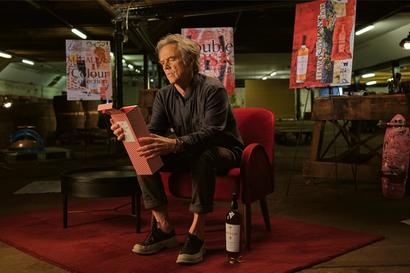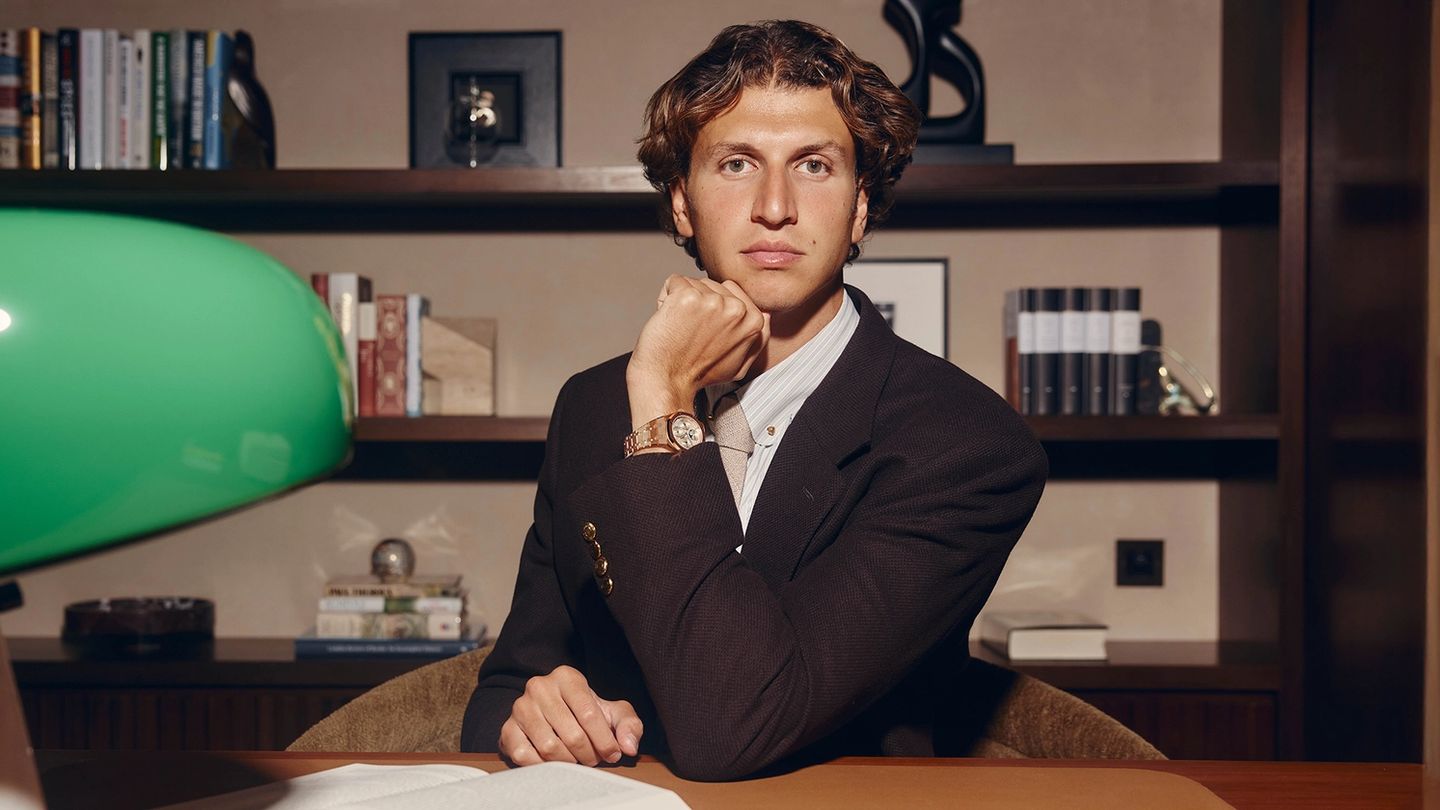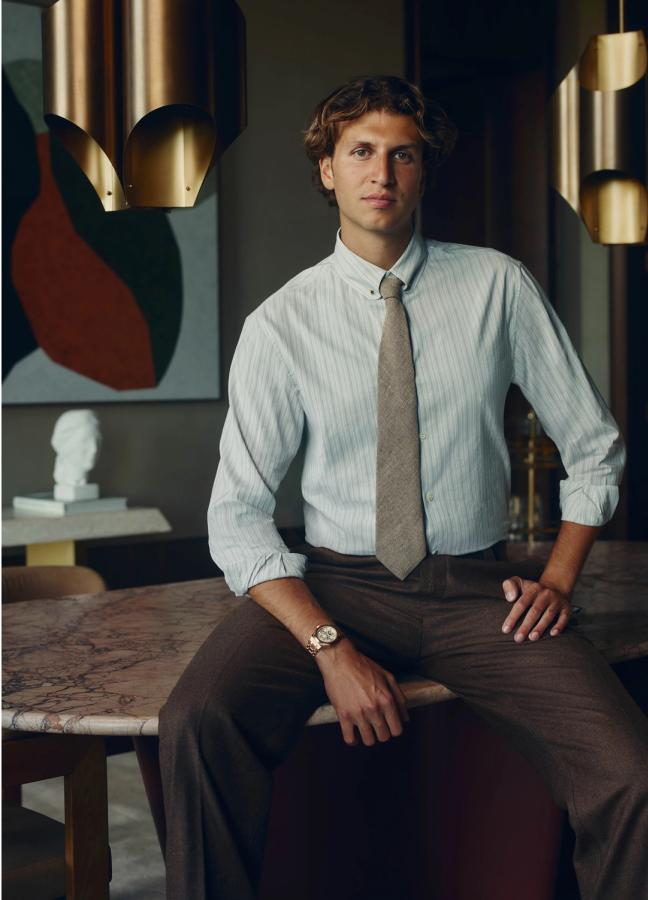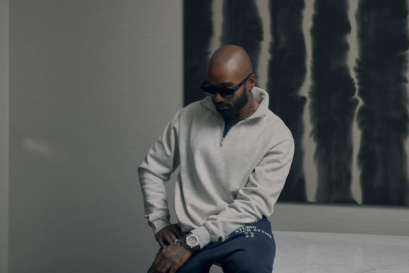

“Money makes the good better and the bad worse..." Gstaad Guy on wealth, self-expression, and kindness
With his jolly skewering of the 0.1%, Gstaad Guy has curated the most valuable Instagram following on the planet. But he's only just getting started.
- Words: Joseph Bullmore
- Photography: Greg Funnell
- Styling: Zak Maoui
- Hair: Jack Merrick-Thirlway
Gstaad Guy’s motto is “It’s all family.” It’s the constant refrain of Constance, the cashmere-cloaked, spaniel-haired character that has made him recognisable across the universe (or at least throughout Porto Cervo, which is pretty much the same thing.) The ‘Family’ includes the likes of Julio Iglesias, Andrea Bocelli, Celine Dion, and the Prince of Wales — imagined pals (and, in at least one instance, lovers) of old Constance.
But the Family also extends to the staff in the Loro Piana boutique in Gstaad, who pop the latest pair of butter-soft Open Walks on Constance’s personal account and trot the bags round to his chalet before his lunch at the Sonnenhof is over.
And nowadays, in a very real way, it encompasses any of his two million Instagram followers, many of whom approach him every day to speak to him — his six-foot-six frame and caramel sweep of hair making him recognisable almost anywhere, even when he isn’t wearing the patrician frown for which Constance is renowned.

Loro Piana blazer, £3,495; shirt, £990; tie, £225; trousers, £1,345, all loropiana.com; Audemars Piguet Royal Oak Selfwinding Perpetual Calendar, £POA, audemarspiguet.com
Gstaad Guy is a new type of famous person. One for whom the tags ‘celebrity’ and ‘influencer’ feel both somehow inadequate. More recognisable than many film stars or musicians of his vintage these days; and yet more approachable than the gatekept stars of legacy media — perhaps due to the fact that he is beamed into our smartphone (and thus our psyche) almost every day.
The account began as an affectionate skewering of one of Gstaad Guy’s (real-life) friends, who lived a wildly oofy life in the Swiss mountain resort of Gstaad. But six years on from that first post, his lampoons have come to mean a great deal to all sorts of people — depending who those people are and just how much Like Us they happen to be. Is Gstaad Guy a funhouse mirror to the wealthy? A handbook to the highlife? A comment on the absurdities of the 0.1%? A friend in high places? A great bridger of worlds? Or a soothing balm for our fractious times?
"People would actually talk to me for a second, and it'd be a bit of a system malfunction..."
“I'm grateful for my followers,” he says now, sitting behind a broad desk in a quite glorious suite at the Chancery Rosewood hotel in Mayfair. “I think I have a similar effect on them to the one that Shrek had on my family,” he laughs. “My family and I watched Shrek growing up. And I would laugh at one joke. My dad would laugh at another joke. And my mom would laugh at another joke. We would enjoy it as a family, but for different reasons. And it kind of brought us together.”

Loro Piana blazer, £3,495; shirt, £990; tie, £225; trousers, £1,345, all loropiana.com; Audemars Piguet Royal Oak Selfwinding Perpetual Calendar, £POA, audemarspiguet.com
Until fairly recently, many of Gstaad Guy’s followers seemed to forget that the flesh-and-bones creator was not, in fact, the same person as his on-screen character, Constance. (It is a pleasing quirk of his story that Gstaad Guy, at the time of his very first post, had never even set foot in Gstaad.) “The most reasonable bet they could make was like: let me bond with this guy on the material things. Let me try to one up him,” he says. “They’d name drop someone, or say: ‘actually, my chalet is next to yours,’ even though I obviously don’t have my own chalet. And then they would actually talk to me for a second, and it'd be a bit of a system malfunction. They'd realize: wait, he's not impressed by this. He’s nothing like his character. And so maybe I'll build a connection with him by being kind,” he says. “Which is actually a beautiful outcome.”
Gstaad Guy means a lot to his followers. Some of them say his characters helped them get through tough times, or helped them to “form opinions” about the world around them. “Over the past two years especially, I've tried to be really intentional about what value Gstaad Guy delivers,” he says now. “I like the word gentleman. I think Gstaad Guy's a gentleman — but in the real definition of the word: someone who's first and foremost gentle and kind and intentional about their actions.”
“My US audience take the advice of Gstaad Guy very seriously...”
Different tribes respond to his characters in different ways. (Characters plural, because the other half of Gstaad Guy’s split-personality is Colton, Constance’s Cali-speak, crypto-bro cousin.) “Most of the world's money has been made in the past 10 years, and most of it was made in the US, the largest economy in the world,” he says. “So you have all this money being made in the US by fairly young people. And a lot of them are very Euro-curious. They love it. They want to spend their money in Europe — but they feel judged by Europeans. They’re not going to buy an etiquette book. But they'd love to have a friend who can tell them: don't go to that restaurant; go to this one. And here's how you should behave while you're there,” he says. “My US audience is growing right now, and they actually take the advice of Gstaad Guy very seriously.”
The haute Swiss, meanwhile, see their lives and mores reflected back at them in rich-detail and with a certain “nostalgia”, he says. Many of them feel that “Constance is saying the things my father told me when I was growing up.”

The fact that Gstaad Guy can nimbly straddle this divide is due to his creator’s unique upbringing. “I grew up privileged, and my parents, like most parents, always wanted the best for their kids.” They would work hard to put the young Gstaad Guy “in places where we were just about making the cut of that environment,” he says. “It meant I was very aware and very grateful for my privilege, but I was never the most privileged person in that room,” he says. “So I'd always be aware of how high the ceiling was of craziness.”
In his early twenties, Gstaad Guy began to “understand the ridiculousness” inherent in so much of the high life, he says. “I saw how seriously people were taking things that were so trivial. A luxury, by definition, is trivial. That's why it's called a luxury.” He has always been “very observant,” he says, “and I've always bucketed archetypes. Not in a judgemental way. But I have a fairly strong radar.” He gives the example of the modern, international trust fund kid who pretends to work for a living. They have a couple of instant tells, he says. “They’re really into longevity. Into sauna. Into cold plunging. Into certain sports like padel. If I hear a guy talking about all those things, then they probably don't work,” he laughs.
Has his exposure to that world shown him the darker side of massive wealth? Is there a certain melancholy or loneliness, perhaps, to being very, very rich?
“I think the closer you are to vice, yes,” he says. “A great physical representation of this, I think, is London’s boroughs and neighborhoods. I think Mayfair is a breeding ground for depression. It's also a breeding ground of wealth and money and, and in the daytime you have of course all these office spaces and people working hard. But in the evening, Mayfair is extravagant and in many ways dark and fueled by vice, and it's quite soulless.”
“But then you have beautiful neighborhoods like Hampstead, which has a very similar wealth bracket — but it's filled with parents teaching their kids how to go biking and feeding the ducks,” he says. “So is it a money thing? I don't think so. I think it's actually more of a ‘pick your poison’ thing. The closer you get to the vice and the darkness, the more you see these people that are depressed, which shouldn't really be a surprise.”
“Money is just an amplifier. It makes the good better and the bad worse..."
In essence, he says, “money is just an amplifier. It makes the good better and the bad worse. And it just compounds life in crazy ways. People that have a good head on their shoulders and make money can do beautiful things with it. I think a lot of people who have a lot of resources do very charitable things. They do very tasteful things. They bring those that they love on the journey with them. They actually add value.”
“And then you have the exact inverse, where people are simply trying to milk and exploit every opportunity in a horrible way. But I think I'm blessed to say I've seen as much good as bad.”
Gstaad Guy was working at Apple when his Instagram account began to take off rapidly — at first by being shared across Whatsapp by the chaleted classes, who all had a friend like Constance. He watched a video on YouTube about how to make cheap merchandise and print it to order. He put a link live on a website and sent it out to his followers — and made more money in a couple of hours than he did in his monthly pay cheque. It must have seemed like a bold (and parentally bewildering) decision to quit his job at the biggest company in the history of the world to pursue this beautifully niche character full time. But it has obviously paid off. To take a small (but telling) example: Gstaad Guy was the first ambassador that Loro Piana ever had. His Instagram following, meanwhile, is said to hold the highest proportion of ultra high net worth individuals on the platform.
Stratospheric success like this can sometimes look effortless from the outside. There have been flops, however. “Most businesses I have tried to start have completely failed. I tried to start a skincare business which failed. A haircare product that failed. The rosé business is struggling. I've tried all these different things and a couple things stick.” The reasons for the failures are simple to see in hindsight. “I have no credibility in skincare. Here's a comedic guy, frowning, who is telling me to trust his skin care regime. Is he joking about that? People don't want to take risks with their skin. So that didn't work.”
On the other hand, his charm bracelet company, Poubel — which takes its name from the phrase Constance uses when dismissing something that’s gauche, unpalatable, or simply wrong — is hyper popular among a certain set, who love the little hand-painted signifiers they can string together around their wrists. There is now an official St Moritz collection, including a tiny fondue, and a charm modelled on The Palace hotel in Gstaad that is, of course, entirely sold out.
“I want to help people to build friendships as fast as possible.”
These bracelet links forge connections, too. They are little, wearable inside jokes; conversation-sparkers. “I’m really playing on expression,” Gstaad Guy says. “Which is a category I’m credible in. I'm helping people express who they are in a way that's authentic to the rest of their existence. And I want to help people show a side of themselves that they sometimes bury.” Ultimately, he says, “I want to help people to build friendships as fast as possible.”
Gstaad Guy is carefully beginning to express who he really is, too — slowly sliding off the venerable mask of Constance. His new-ish Gstaad Guy Podcast sees him out of character, interviewing guests from Google’s Eric Schmidt to longevity guru Bryan Johnson.
He is a good and natural interviewer, deploying the same social radar and curiosity which made Gstaad Guy such a hit in the first place. “I love really ripping things apart and really understanding them,” he says. “I am interested in intention, and understanding why people act the way they do, consume the way they do. I wouldn't say I've mastered it by any means. But understanding intention is the first step of being empathetic.” And empathy, in the digital wave that his creations have so nimbly ridden, is everything. In other words: it’s all family.
Subscribe to Gentleman's Journal now to receive this issue to your door.
Read next: How Much Does a Private Jet Really Cost?


